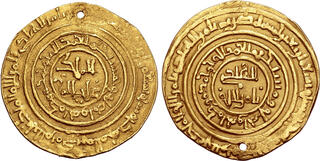| Roma Numismatics Ltd. > Auction XXX | Auction date: 21 March 2024 |
| Lot number: 689 Price realized: 7,000 GBP (Approx. 8,867 USD / 8,164 EUR) Note: Prices do not include buyer's fees. | Show similar lots on CoinArchives Find similar lots in upcoming auctions on |
| Lot description: North Africa (Norman Kingdom). William I AV Dinar. Mahdia mint, dated AH 549 = AD 1154/5. Kufic legend outer circle: 'Struck by order of the guide according to the command of God, King William, in the city of Mahdia in the year 549'; inner circle: 'Praise be to God, it is fitting to praise Him and, He is deserving and worthy [of praise]'; centre: 'King William' / Kufic legend: outer and inner circles as obverse; centre: 'the Guide according to the command of God'. For the only other known specimen see J. Rodriguez Lorente and T. Ibrahim, Numismatica de Ceuta Musulmana, Madrid, 1987, 221 = J. Johns, 'Malik Ifriquya: The Norman Kingdom of Africa and the Fatimids', Libyan Studies 18, 1987, pp. 92-4 = MEC 14, p. 120 = H. Abdul-Wahab, 'Deux dinar normands de Mahdia', Revue Tunisienne 1930, 1/3-4: pp. 215-218 and plate. 4.08g, 24mm, 6h. Good Very Fine; contemporary piercing. Of the greatest rarity - the second recorded example. Ex Roma Numismatics Ltd., Auction XVIII, 29 September 2019, lot 1364. Roger (Roger) II, who became King of Sicily in 1130, made his kingdom the dominant power in the Mediterranean, thanks to a powerful fleet led by capable several admirals. He then made a series of conquests on the African coast, ranging from Tripoli (Libya) to Cape Bon (Tunisia) and Bona (Algeria) creating a Sicilian "protectorate", supported in part by the remaining small Christian-Byzantine community still present in North Africa. In 1146 the Norman king took advantage of the internal troubles within Tripolitania to take, along with Admiral George of Antioch, the city of Tripoli and the coastal region of Sirte and in 1148 Mahdia, the ancient Roman city of Aphrodisium. From then on, the authority of the King of Sicily was established on a permanent basis. This authority did not aim at political domination, he was only interested in economic and strategic advantages: both immense. In 1154 William I inherited this small Norman 'empire' along the Ifriqiya coast to the borders of the Sahara as far as Gafsa. The local sheikhs submitted to the authority of the new king of Sicily, who tried to promote new Christian settlements in the region in order to protect the modest Christian population already existing. However, in 1156 Sfax was lost followed by Mahdia in 1160 to the Berber Muwahhidun, ('the monotheists' or 'unifiers'), commonly known as the Almohads. Estimate: 5000 GBP |  |


